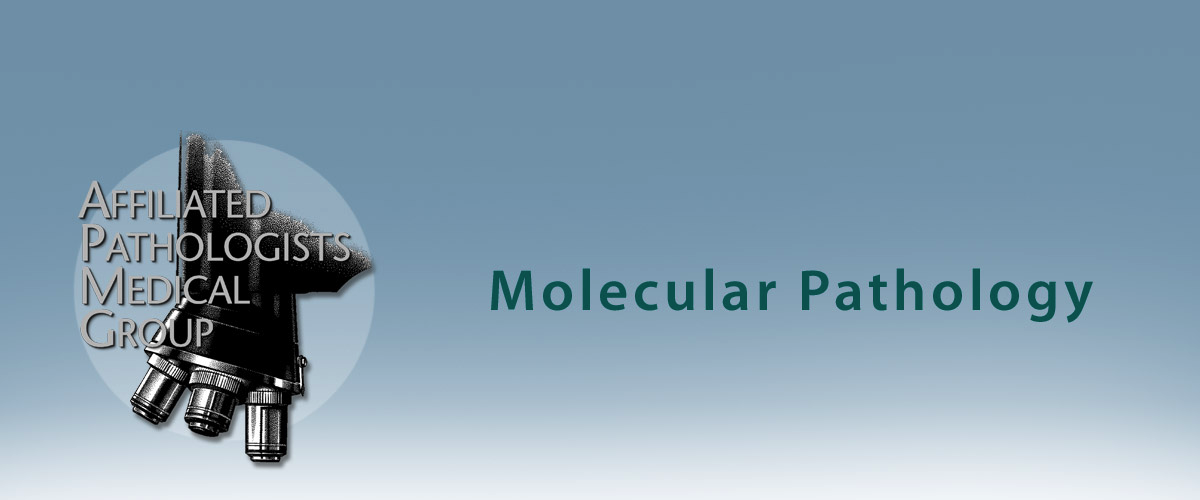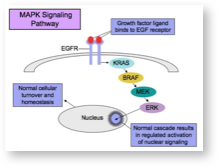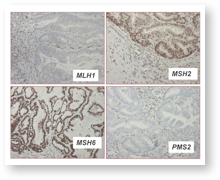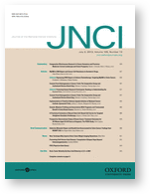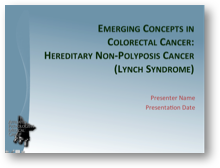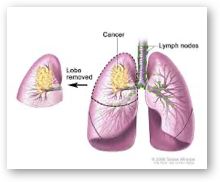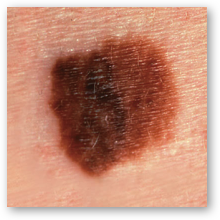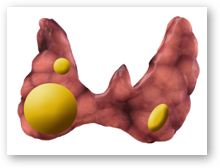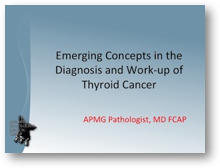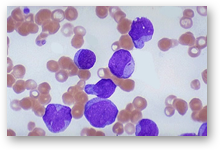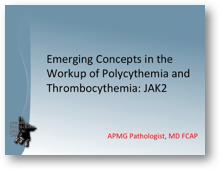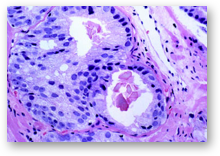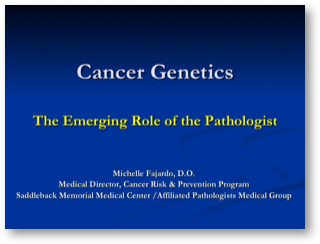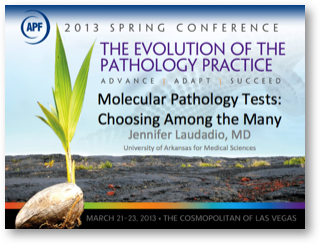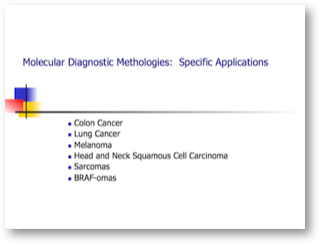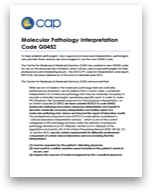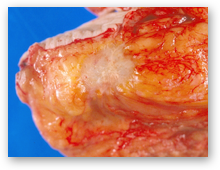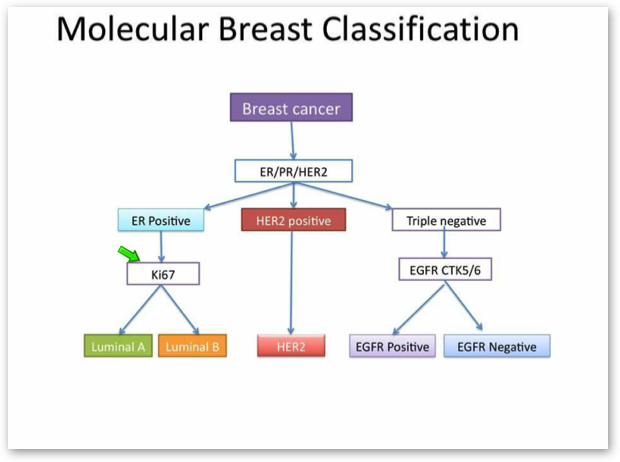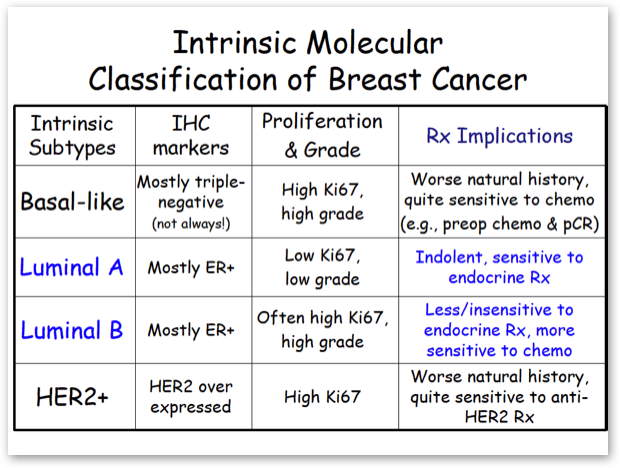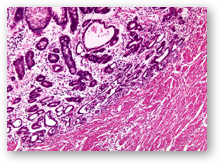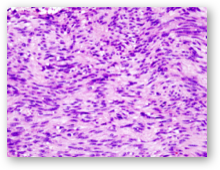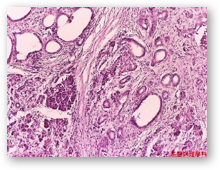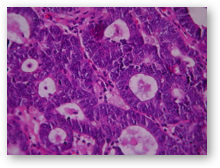
Colon
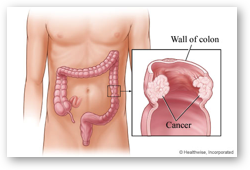
Colorectal Carcinoma
This section includes molecular pathways, Lab Testing for Lynch Syndrome and Mismatch Repair Genes, Bethesda and NIH Guidelines, Carcinogenesis Pathways article, and a template for presenting Colon Molecular Testing at your tumor board.
Mismatch Repair Genes IHC Testing and Lynch Syndrome Comments
These were compiled by Michelle Fajardo, DO, pathologist at Saddleback Memorial Medical Center.
View them HERE.
References
J Clin Oncology 2013:31:1336-1340
CAP Special Presentation on Emerging Concepts
Tumor conference template discussing Hereditary non-polyposis cancer (Lynch Syndrome)
Download the PowerPoint presentation HERE.
Tumor conference template discussing the molecular workup of Colorectal Cancer.
Download the PowerPoint presentation HERE.
Lung
Lung Carcinoma
This section includes molecular pathways for lung adenocarcinoma.
View the page HERE.
CAP PowerPoint Presentation on Molecular Diagnosis of Lung Cancer can be downloaded HERE.
CAP webinar on Lung Cancer Molecular testing can be viewed HERE.
CAP Lung Cancer Resource Page can be viewed HERE.
Archives of Pathology article on molecular testing can be viewed HERE.
CAP Today article on New Guidance on Lung Cancer Testing can be viewed HERE..
Patient Guide to lung cancer testing can be downloaded HERE.
FAQs in regard to Molecular Testing Guideline for Selection of Lung Cancer Patients for EGFR and ALK Tyrosine Kinase Inhibitors can be downloaded HERE.
View the page HERE.
CAP PowerPoint Presentation on Molecular Diagnosis of Lung Cancer can be downloaded HERE.
CAP webinar on Lung Cancer Molecular testing can be viewed HERE.
CAP Lung Cancer Resource Page can be viewed HERE.
Archives of Pathology article on molecular testing can be viewed HERE.
CAP Today article on New Guidance on Lung Cancer Testing can be viewed HERE..
Patient Guide to lung cancer testing can be downloaded HERE.
FAQs in regard to Molecular Testing Guideline for Selection of Lung Cancer Patients for EGFR and ALK Tyrosine Kinase Inhibitors can be downloaded HERE.
Melanoma
Melanoma
This section includes molecular pathways for melanoma.
View the page HERE.
BRAF & cKIT
Recent advances in the treatment of metastatic melanoma with BRAF and KIT inhibitors have increased the demand for molecular testing in melanoma. Currently, routine testing is mostly limited to BRAF and KIT.
NRAS
Activating mutations in the neuroblastoma rat sarcoma viral oncogene homolog (NRAS) gene are common genetic events in malignant melanoma being found in 15–25% of cases. NRAS is thought to activate both mitogen activated protein kinase (MAPK) and PI3K signaling in melanoma cells. Results suggest that combined targeting of the MEK/ERK and PI3K/mTOR pathways has antitumor activity and might serve as a therapeutic option in the treatment of NRAS mutant melanoma, for which there are currently no effective therapies.
View the page HERE.
BRAF & cKIT
Recent advances in the treatment of metastatic melanoma with BRAF and KIT inhibitors have increased the demand for molecular testing in melanoma. Currently, routine testing is mostly limited to BRAF and KIT.
NRAS
Activating mutations in the neuroblastoma rat sarcoma viral oncogene homolog (NRAS) gene are common genetic events in malignant melanoma being found in 15–25% of cases. NRAS is thought to activate both mitogen activated protein kinase (MAPK) and PI3K signaling in melanoma cells. Results suggest that combined targeting of the MEK/ERK and PI3K/mTOR pathways has antitumor activity and might serve as a therapeutic option in the treatment of NRAS mutant melanoma, for which there are currently no effective therapies.
CAP Special Presentation on Emerging Concepts
Tumor conference template discussing the molecular workup of Melanoma.
Download the PowerPoint presentation HERE.
Thyroid
Papillary Thyroid Carcinoma
This section includes molecular pathways for papillary thyroid carcinoma.
View the page HERE.
View the page HERE.
CAP Special Presentation on Emerging Concepts
Tumor conference template discussing the Molecular Workup of Thyroid Cancer.
Download the PowerPoint presentation HERE.
Heme
CAP Special Presentation on Emerging Concepts
Tumor conference template discussing the work up of Polycythemia and Essential Thrombocythemia (JAK2).
Download the PowerPoint presentation HERE.
Edit Panel Title
Prostate Carcinoma
Markers
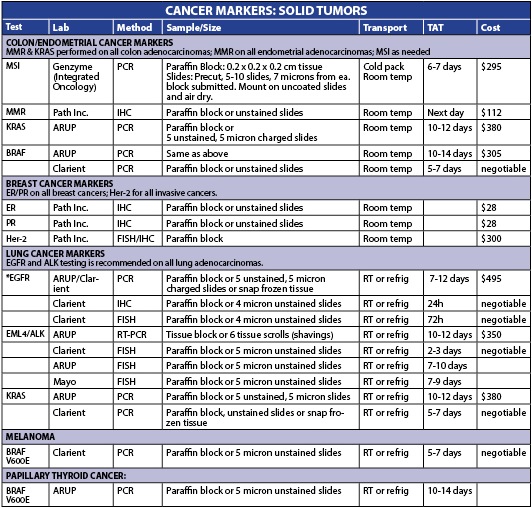
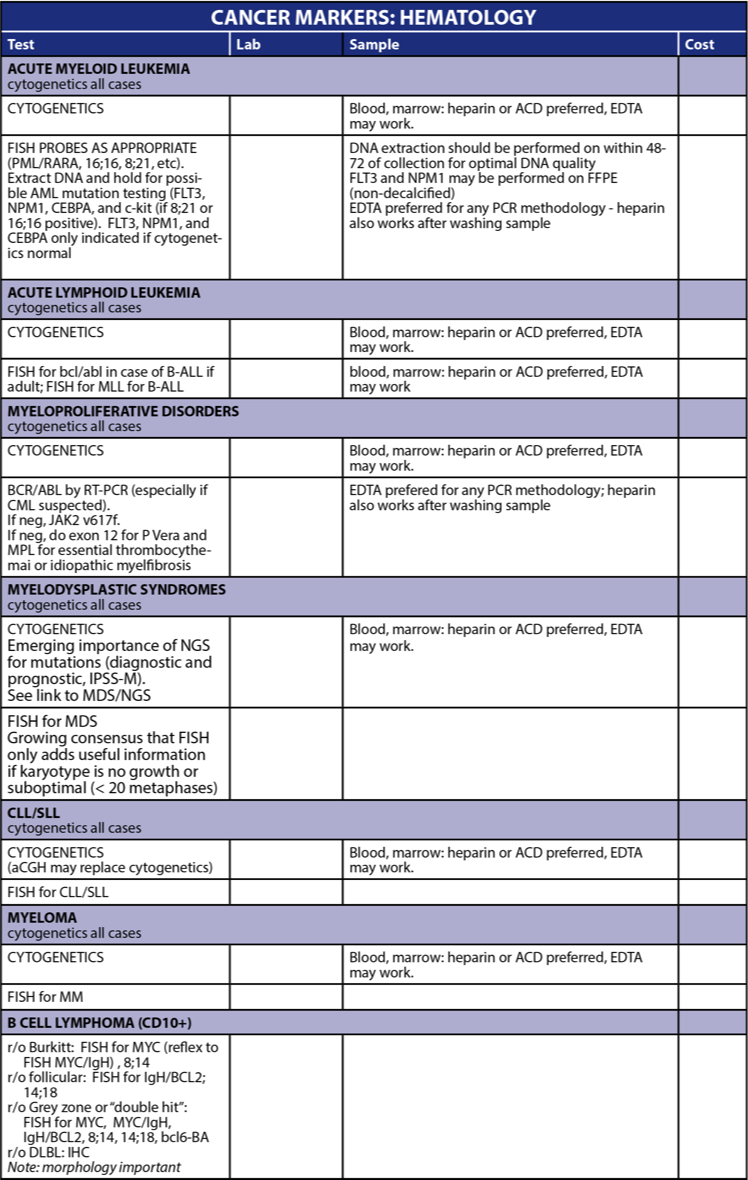
Genetics
Cancer Genetics presentation by APMG Pathologist Michelle Fajardo, DO. This was given at the 2013 Advance 3.0 meeting in Long Beach.
Download the PowerPoint file HERE.
Download the PowerPoint file HERE.
Molecular Pathology Tests: Choosing Among the Many, presented by Jennifer Laudadiio, MD at the American Pathology Foundation meeting in Las Vegas, 2013. Download the PowerPoint PDF file HERE.
Short Presentations in Emerging Concepts (SPECs)
These are CAP PowerPoint templates for pathologists to use at tumor boards or other teaching conferences. They focus on selected diseases where molecular tests play a key role in patient management.
View them HERE.
APMG has customized them with our own logo and added information (see above).
These are CAP PowerPoint templates for pathologists to use at tumor boards or other teaching conferences. They focus on selected diseases where molecular tests play a key role in patient management.
View them HERE.
APMG has customized them with our own logo and added information (see above).
Moleular Pathology CPT codes
Published by the CAP, this document explains the use of the G0452 code.
Download the Guide HERE.
Published by the CAP, this document explains the use of the G0452 code.
Download the Guide HERE.
References
Breast
Breast Cancer
This section includes the molecular diagnosis of breast cancer. The main types are luminal A, luminal B, and basal-like.
NCCN Hereditary Breast/Ovarian Cancer Guidelines are found HERE.
NCCN Hereditary Breast/Ovarian Cancer Guidelines are found HERE.
Other Neoplasias
Molecular Studies in other Neoplastic Diseases
- Gastric Adenocarcinoma
- Gastrointestinal Stromal Tumors (GIST)
- Pancreatic Carcinoma
- Endometrial Carcinoma (Endometrioid Adenocarcinoma)
- Gliomas
Gastric Adenocarcinoma
HER2 (FISH)
Trastuzumab in combination with capecitabine or 5-fluorouracil and cisplatin is approved for the treatment of patients with human epidermal growth factor receptor 2 (HER2)-positive (immunohistochemistry 3+ or immunohistochemistry 2+/fluorescence in situ hybridization-positive or immunohistochemistry 2+/silver in situ hybridization-positive) metastatic adenocarcinoma of the stomach or gastro-esophageal junction.
Trastuzumab in combination with capecitabine or 5-fluorouracil and cisplatin is approved for the treatment of patients with human epidermal growth factor receptor 2 (HER2)-positive (immunohistochemistry 3+ or immunohistochemistry 2+/fluorescence in situ hybridization-positive or immunohistochemistry 2+/silver in situ hybridization-positive) metastatic adenocarcinoma of the stomach or gastro-esophageal junction.
Pancreatic Neoplasms
The CAP PowerPoint presentation on Molecular Diagnosis of Pancreastic Neoplams can be downloaded HERE.
Endometrial Cancer (Endometrioid type)
PIK3CA & PTEN
Somatic mutations of PIK3CA have been detected in ~30% of endometrial carcinomas. The H1047R mutation is the most common of these mutations accounting for ~30% of PIK3CA mutations in these cancers. Mutations and deletions of the PTEN tumor suppressor gene are the most common genetic change yet found in endometrial adenocarcinoma, with estimates of the mutational rate ranging from 34-83%. Mutations in the PIK3CA and PTEN genes lead to frequent activation of PI3K pathway signaling in endometrial cancer, making this pathway an attractive target for therapy in these tumors. Several trials are currently ongoing with agents targeting this pathway and data suggest that PIK3CA mutations predict response to PI3K/AKT/mTOR inhibitors.
Somatic mutations of PIK3CA have been detected in ~30% of endometrial carcinomas. The H1047R mutation is the most common of these mutations accounting for ~30% of PIK3CA mutations in these cancers. Mutations and deletions of the PTEN tumor suppressor gene are the most common genetic change yet found in endometrial adenocarcinoma, with estimates of the mutational rate ranging from 34-83%. Mutations in the PIK3CA and PTEN genes lead to frequent activation of PI3K pathway signaling in endometrial cancer, making this pathway an attractive target for therapy in these tumors. Several trials are currently ongoing with agents targeting this pathway and data suggest that PIK3CA mutations predict response to PI3K/AKT/mTOR inhibitors.
Gliomas
MGMT methylation
MGMT promoter methylation is the key mechanism of MGMT gene silencing and predicts a favorable outcome in patients with glioblastoma who are exposed to alkylating agent chemotherapy.
IDH1&IDH2
IDH mutation tests can help distinguish pilocytic astrocytomas (WHO grade I) from diffuse astrocytomas (WHO grade II), since these lesions can sometimes be difficult to categorize solely on the basis of histopathological criteria.
MGMT promoter methylation is the key mechanism of MGMT gene silencing and predicts a favorable outcome in patients with glioblastoma who are exposed to alkylating agent chemotherapy.
IDH1&IDH2
IDH mutation tests can help distinguish pilocytic astrocytomas (WHO grade I) from diffuse astrocytomas (WHO grade II), since these lesions can sometimes be difficult to categorize solely on the basis of histopathological criteria.
PDL1 and PD1
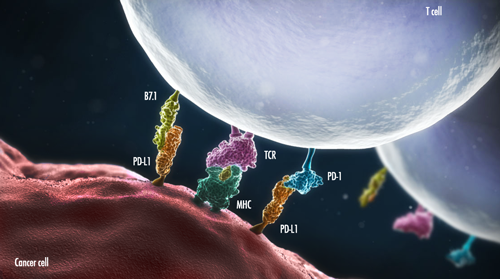
Immune Therapy
PD1 and PDL1
PD1 and PDL1 can block the immune response to malignant cells. New drugs can prevent this and promote tumor cell recognition and destruction.
More Information HERE.
PD1 and PDL1 can block the immune response to malignant cells. New drugs can prevent this and promote tumor cell recognition and destruction.
More Information HERE.

